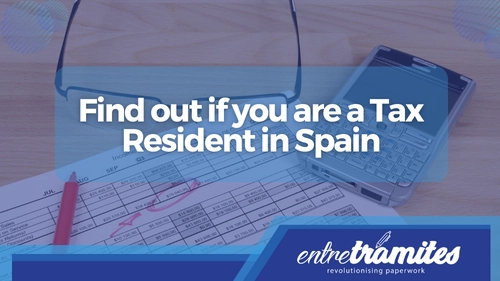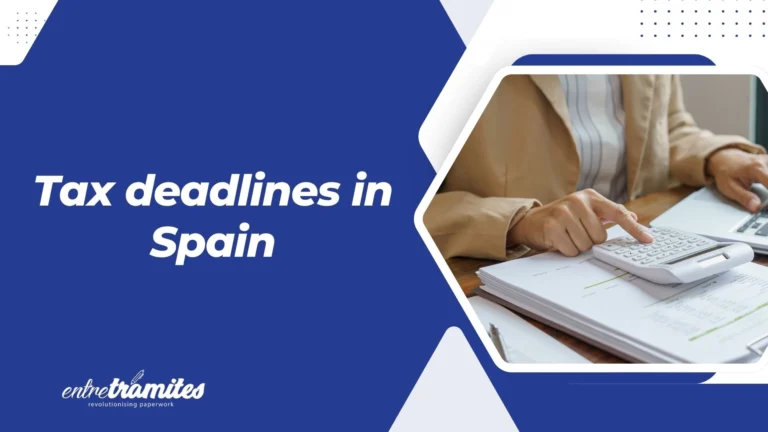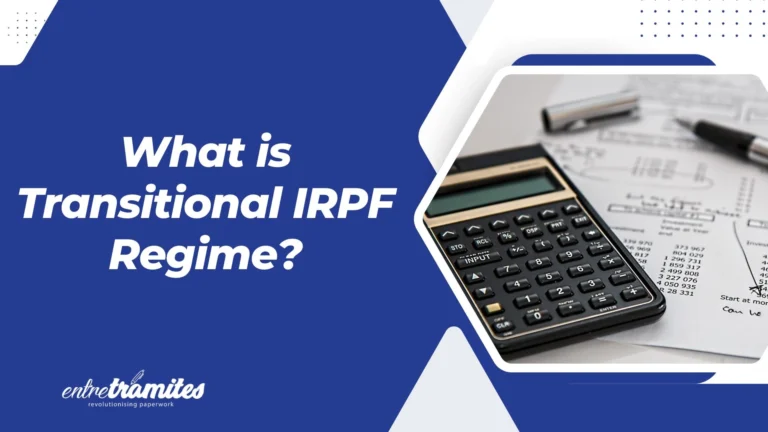What is tax residence?
Tax residence is the condition that, according to the Tax Agency, a foreigner acquires by living for a long time during the year in Spain and/or having economic interests in the country, which leads to the creation of an obligation to pay a series of fees and certain percentages of taxes.
Being classified as a tax resident in Spain or not has important consequences because in many cases we will pay fewer taxes and lower percentages if we are not a resident, so it can be a very interesting alternative for many foreigners.
When is a person considered a Tax Resident in Spain?
Pursuant to article 9 of Law 35/2006, the Tax Agency considers that a person is a tax resident in Spain if they meet any of the following three conditions:
- Staying more than 183 days a year in Spain.
- Having the core of their economic interests directly or indirectly in Spain.
- Their spouse or child habitually resides in Spain
Let’s look at these three points in detail to understand what exactly they mean.
Staying more than 183 days a year in Spain:
If at the end of the year (counting the calendar year, from January to December), you add up all the days you have been in Spain and there are more than 183, you are considered a tax resident in Spain.
In addition, it is not necessary that these days are consecutive, you will do the calculation regardless of it.
Keep in mind that temporary absences do not count. In other words, if, for example, you go away for a weekend or go on vacation for half a month, these days continue to be counted as the period of time lived in Spain, with the same weight for the total of 183 days.
Having the core of your interests in Spain
This point is key, as it may be that you spend less than 183 days a year in Spain but you are still considered a resident for tax purposes.
How can this happen? If, for example, you are an employee who travels a lot around the world for work reasons, it is difficult to count how long you have really been in Spain, reaching less than 183 per year. However, as the reason for your frequent travels has been promoted by a Spanish company with its headquarters and all its offices in Spain, you have the core of its interests in Spanish territory.
Therefore, you are a tax resident in Spain.
Spouse and children in Spain
We can also have a case in which both our partner (spouse not legally separated) and/or minor children live regularly in Spain and depend on us.
It is the typical situation in which the father or mother lives in Spain taking care of the child (a child who goes to school in Spanish territory), while the other member of the couple spends the year traveling for work.
This situation will cause the Tax Agency to consider us a tax resident in Spain, and although evidence is admitted against this, it will be very difficult to prove that this situation does not really occur.
However, there is an exception that will make it much easier to prove that we are not a tax resident in Spain: the Tax Residence certificate.
Obtain a Tax Residence certificate from your country
This certificate allows you to justify yourself before the Tax Agency and avoid being considered a tax resident in Spain, thus avoiding the payment of any taxes in Spanish territory.
It is the proof issued by the country of origin or in which we have our main economic interest to justify that we are really residents there, and therefore we should not pay tax as residents in Spain.
In the case of being able to obtain the tax residence certificate in your country, the Tax Agency will not consider that person as a tax resident in Spain, even if they are in the country 183 days a year.
This certificate works in accordance with the regulations of the agreement between Spain and that country, generated through a double taxation agreement.
In addition, it is valid only and exclusively for one year. This means that it is valid for the year in which we request it, and we must request it year after year to continue participating in this exception if we wish and our situation applies.
However, most European countries have the same tax criteria as Spain, so if you live in Spanish territory for more than 183 days, it is most likely that you will not be granted the certificate.
Certificates from EU countries or the United States are usually always accepted by the Tax Agency, although those from Asian or Middle Eastern countries tend to generate more difficulties.
Tax implications according to Tax Residence
Taxes for non-residents
Foreigners and non-foreigners considered non-residents in Spain must mainly pay two taxes:
Non-resident income tax
Due to the double taxation agreements, the most common thing is that the non-resident in Spain has to pay income tax as a non-resident only in what refers to real estate properties.
Thus, if you have a property in Spain, you must pay this tax. And we find two different situations:
If the apartment you have in Spain is rented. In this case, you must declare your rental income quarterly, and you will pay 19% of it if you are from a member country of the European Union, and 24% if you are not.
If the apartment or house is not rented and you use it when you come to Spain (that is, it is usually empty), then you will not have to declare anything quarterly. The only tax obligation that you will have will be annual, and you will have to pay an imputation of income.
For this, you will pay 19% or 24% depending on your country of origin applied to the property’s cadastral value, which will have to be multiplied by 1.1% or 2% depending on whether the cadastral value was reviewed in the last 10 years or not.
In both cases, you must declare your taxes using Form 210.
Wealth tax
If you are a non-resident, you will also have to pay wealth tax on those properties that you have in Spain as long as their purchase value is greater than €700,000 (depending on your region in Spain).
Keep in mind that only the applicable percentage of the value that is above that limit is taxed or paid; that is, from euro 700,001.
On the contrary, in the event that the sum of all your properties in Spain is less than €700,000, you will not have to pay this tax.
It is a personal and progressive tax, ranging from 0.2% to 2.5% depending on the specific value of the properties.
However, if you have mortgaged the property in order to buy it (not for any other purpose) you can subtract the outstanding amount of the property from the total value.
It is paid annually using Form 714.
Resident Taxes
Residents must pay income tax in Spain on all earnings and income generated worldwide. This means that their total taxation in the Spanish territory is much higher since this tax is levied on most of the activities, income, and profits that are obtained.
The exact percentage will depend on each particular case and it is not possible to apply generalizations, although it is a progressive tax that goes from 17% to 47%.
However, there is an exception that many foreigners can request: the Beckham Law. Under this law, if you have not resided in Spain for the last 10 years, you will be able to pay a fixed percentage of 24% on your income even if you are a tax resident in Spain.
You can schedule a free consultation to solve your doubts about the Beckam Law here!
In addition, the wealth tax continues to exist for residents, although in this case the minimum limit for having to start paying it drops to €500,000 in the case of Catalonia (depending on the Autonomous Community, this limit may differ).
Contact us!
We want to listen to you and know what your questions are about the procedures you have to carry out. Count on the advice of our experts to clarify all your doubts.
In Entre Trámites we invite you to know about all our consultation services. Fill in our contact form and we will call you to help you as soon as possible, schedule your online consultation, or simply text our WhatsApp.





